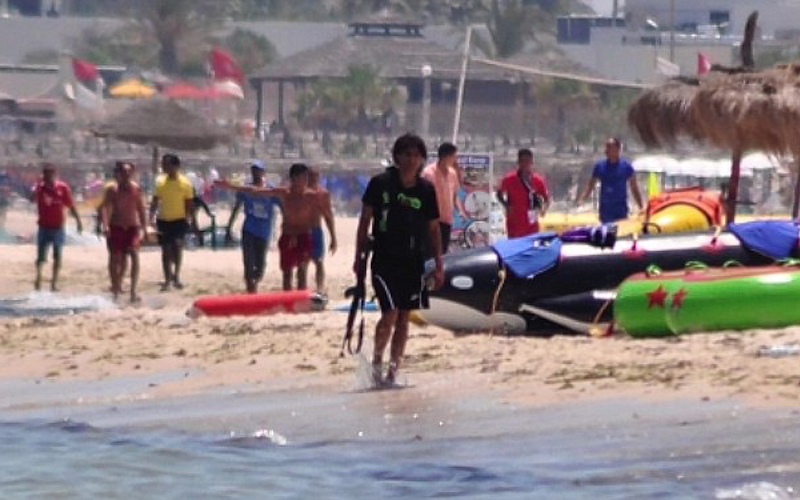
The Dual Threat to Tunisia’s Democratic Transition
In the wake of two major terrorist attacks in 2015, many have asked how Tunisia, the so-called Arab Spring’s lone success story, could somehow also be a hotbed for extremism and the source of violent jihadists. By the end of 2014, the small North African nation had adopted a progressive constitution and conducted three rounds of elections leading to a new parliamentary coalition and the country’s first directly elected president, and appeared poised to experience true democracy. However, Tunisia has supplied the Islamic State and other groups in Iraq and Syria with large number of foreign fighters and has experienced the two deadliest terrorist attacks in its history this year.
Tunisia, as one observer recently noted, is certainly a “country of contradictions.” While the Tunisian government has made several troubling moves redolent of deposed dictator Ben Ali’s policies, the answer to the question so many are asking lies in the grievances that led Tunisians to rise up and overthrow the previous regime which sparked uprisings throughout the Arab world. Although many are concerned that extremism will threaten Tunisia’s transition, the response of Tunisia’s government is equally important to its democratic trajectory and with a recently extended state of emergency and a new anti-terror law passed on July 25, that response has been less than encouraging.
Following the June 26 Sousse attack, President Beji Caid Essebsi declared a 30-day state of emergency, and Prime Minister Habib Essid said the government would shutter 80 mosques accused of “spreading venom” and deploy army reservists to tourist sites.
During a televised address after the Sousse attack, Essid told Tunisians that “The continued threat we face leaves the country in a state of war, where we have to use all measures necessary.”
These moves were roundly decried by Tunisian human rights activists and seemed to confirm the fears of observers who worried after the March 18 Bardo attack that a backslide to authoritarianism was increasingly likely. With the government now extending the state of emergency which allows authorities to raid homes at any time and monitor the media, among other troubling provisions for an additional two months, those prescient fears are becoming a reality.
This is what makes the recent terrorist attacks such an important inflection point for the future of Tunisian democracy. In recent months, Tunisian human rights activists have rung alarm bells over the use of torture by Tunisian security forces, raising the specter of a return to the tactics employed by Ben Ali’s police state. According to the head of the Tunisian Organization Against Torture, Mondher Cherni, “Torture is becoming an epidemic and widespread in Tunisian prisons and police stations. We need to stop it otherwise we’ll return to the old regime’s institutionalized violence and torture.” Many Tunisians also believe that the Nida Tounes government is threatening freedom of speech; a survey conducted by Emrhod Consulting in May found that 55 percent of respondents believed that the government is threatening freedom of speech and silencing critics, an increase of 42 percent since the beginning of the year before the Sousse and Bardo attacks.

With many calling for security reform, Tunisian lawmakers have been debating new anti-terrorism legislation for several months. Overwhelming approved on July 25, the bill would reform laws in place from the Ben Ali era. Yet Human Rights Watch has criticized the powers its gives to police and the reinstitution of the death penalty. Human Rights Watch Deputy Director for Middle East and North Africa, Eric Goldstein, said before the bill’s passing, “Tunisia’s efforts to restore the rule of law after the abuses under Ben Ali will take a step backward if the new counterterrorism proposals are adopted in their present form.” A coalition of Tunisian civil society groups said in a statement, “There are many holes in the law that could open the way to human rights violations.” In a press release after the bill’s passing, the International Federation for Human Rights (FIDH) warned that the legislation “imperils human rights and lacks the necessary safeguards against abuse.” What’s more, earlier this year the government also approved of an armed forces law granting additional powers and protections to the military and security forces. Human rights groups have said provisions in that bill, such as a five-year prison terms for “insulting the morale of security,” contradict the ideals of Tunisia’s revolution and harms freedom of expression and other rights. “When I see those two laws, I feel like the situation in Tunisia might get even worse than the Ben Ali era,” Tunisian Lawyer Anouar Ouled Ali cautioned.
With many former members of Ben Ali’s defunct RCD party now part of Nida Tounes which holds the most seats in parliament and the presidency, there is justifiable concern that the repressive tactics of the old regime are returning in full force. Such authoritarian measures not only betray the ideals of Tunisia’s revolution and further fan the flames of radicalization, they also fail to address the long-term economic conditions that cultivate fertile recruiting ground for groups like Islamic State, with its promises of a salary and a purpose.
Addressing Tunisia’s economic divide is fundamental to tackling its security challenges and consolidating its democracy. One 24-year old Tunisian student told the Financial Times after the Sousse attack, “Our poor neighborhoods are the supply line for the jihadis.” Although demands for economic reform and inclusion were a primary driver of the revolution, Tunisia’s economic situation has actually worsened in the years since. Unemployment reached 15.3 percent last year, compared to 13 percent before the uprising, and anemic growth rates in 2013 and 2014 (2.3 percent and 2.4 percent, respectively) fell well below pre-revolution levels. Even more disconcerting, a recent OCED report called Tunisia’s 40 percent youth unemployment rate “a true social tragedy.”
In the days since the revolution, which the World Bank has said “democratized corruption in Tunisia,” economic inequality between rural and urban areas, a key grievance of the protesters in the country’s interior regions that started the revolution, has also grown. For those unemployed youth and others who have seen no economic benefit in the last four years, there has been little difference between dictatorship and democracy in their daily lives.
There is much to be done in order to address these economic grievances. Rooting out the culture of corruption in Tunisia that has continued to flourish beyond Ben Ali is a critical first step. Reforming the byzantine regulatory structure is a must, as it places an undue bureaucratic burden on small and medium sized businesses and greases the skids for corruption, with corrupt officials often demanding bribes. Education reform that encourages citizens to think critically and engage with societal problems, rather than emphasizing rote memorization, will give the Tunisian labor force the skills to successfully join the labor market. The yawning wealth gap between the country’s wealthy coastal regions and its interior must also be prioritized. With Tunisians increasingly taking to the streets to press for social and economic justice, these efforts, which are only a starting point, will help stem the tide of extremism and meet the demands of the revolution.
When I was in Tunisia in late November 2014 to cover its first presidential election since the ouster of Ben Ali, there was a palpable air of optimism about the country’s democratic future. Less than a year later, a dual threat to Tunisia’s democratic transition has emerged, with extremists mounting attacks in an effort to imperil the tourism industry, the country’s economic lifeblood, and the Tunisian government returning to the repressive tactics of the Ben Ali era. Rather than engaging in the same, seemingly endless, cycle of violence that so many Arab countries are mired in, Tunisia could once again be a polestar and pioneer for the region. If the Tunisian government is serious about tackling the country’s security challenges, it must address the economic grievances that have led many to join radical groups. Tunisia’s democratic story can only be viewed as a success once efforts to redress these grievances begin.

